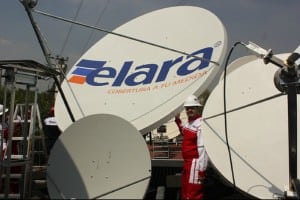Latest News
[Via Satellite 08-19-2015] Mexican telecommunications company Elara Comunicaciones has recently struck a partnership with private equity firm Northgate Capital that will enable the company’s “aggressive” growth plans over the next five years. In exchange for a control stake in the teleport, Northgate will invest up to $38 million in the company through primary and secondary transactions so as to facilitate Elara’s continued expansion of its satellite-delivered voice and data communications services throughout Mexico, its home market, as well as the U.S. and Latin America.
“Over the last 10 years we have been growing at a very rapid pace. We have, in our first 10 years, grown an estimated 35 to 40 percent compound growth, yearly,” Jorge Villarreal, Elara’s founder and chief executive officer, told Via Satellite. As resources to support this rapid organic growth began to wear thin, in 2013 the company began to analyze the requirements to continue the swift expansion. Elara reached out to investment funds, eventually striking a deal with Northgate for a control stake in late 2014, which was approved by regulators earlier this month.
Northgate will now act as a major financial and corporate arm for Elara, and will take part in strategic decisions for the commercial plans and objectives, as well as with the expansion, growth and organizational initiatives of the operator. “The partnership will allow the company to continue growing with ambitious objectives for the next five years,” Villarreal added.
Elara currently operates more than 6000 Very Small Aperture Terminals (VSATs) for corporate voice, data, and video. The company also operates several satellites in Ku-, Ka- and C-band that deliver telecommunications to remote areas. Although Elara’s main market share is in Mexico as a teleport service provider, it has been executing growth plans for the last several years to swell service to areas its satellites already provide coverage to, such as Guatemala, Colombia, Ecuador, Bolivia, Argentina, Peru and Chile.
Elara’s main customer base is in the enterprise sector as well as a few main verticals, including oil and gas, maritime, and finance, among others. The company receives the largest chunk of business mainly from telecommunication carriers in Mexico that use Elara’s satellite networks to complement their coverage in remote regions when the traditional ground networks fail to provide sufficient coverage.
“We help them to reach these customers and, at the end, we complement their solution using satellite services,” said Villarreal. It’s in these services that Elara sees the potential for growth. “We plan to continue growing organically indefinitely in Elara’s traditional business, which is providing telecommunications to remote areas. Obviously, we want to combine the experience that Elara has and eventually grow inorganically.”
With the satellite coverage already in place, the company is looking to use what it has learned in its home country to provide similar services in the U.S. and other countries in its footprint going forward.
“In the case of Mexico — and it’s a very similar situation to other countries in Latin America — we have a very good base of potential users. The terrain in Latin American countries is often irregular and difficult, and terrestrial methods don’t reach the full market potential of the country,” he said, noting that Elara has been positioning itself to allow expansion and complement the lack of coverage provided by terrestrial telecommunications companies in these regions.
“The situation that we see in other countries is also similar [to Mexico] in the way that there is a large opportunity in areas that are still under the coverage area and the satellites play an integral role there as well, because the speed at which the terrestrial networks are growing is very slow, and some areas it’s not reaching fast enough. Elara can help fill those gaps with satellite communications.”
Villarreal says the company is primarily exploring telecommunications solutions that take advantage of both terrestrial and satellite communication technology going forward. They are also looking to invest in High Throughput Satellite (HTS) technology.
“We’re very interested in, and in active conversations about, telecommunication technologies that will be available in the regions of Mexico and Latin America for high throughput satellites in Ku- and Ka-band,” said Villarreal. “We think that will open interesting niches and market opportunities where the actual expertise of Elara is a great asset to facilitate our entrance into these segments.”
HTS can open the market to enable higher bandwidth at a low cost for Business-to-Business (B2B) customers in the corporate market, a mass market aimed at Internet for the end user that is currently being neglected.
Recent changes in the telecommunications law in Mexico are also opening a window to new opportunities for Elara.
“There has been an opening for new businesses, fewer barriers to entry and competition in new markets,” said Villarreal. “The new law allows the use of existing infrastructure, increasing competitiveness and reducing the price to the end user, so the use of telecoms will increase substantially in Mexico.”
Elara has already begun the process of expanding products and services throughout new regions. With the Northgate agreement falling into place in parallel with expansion plans, the new funding will allow the operator to continue executing its plans to magnify market presence over a critical growth period.
“This process of expanding our efforts in other countries, in Latin America and the United States, and offering new products and services has started already,” said Villarreal. “In the next three years I think will be critical not only to continue implementation of this plan but also to accelerate the pace at which we’ve been doing this.”
Get the latest Via Satellite news!
Subscribe Now